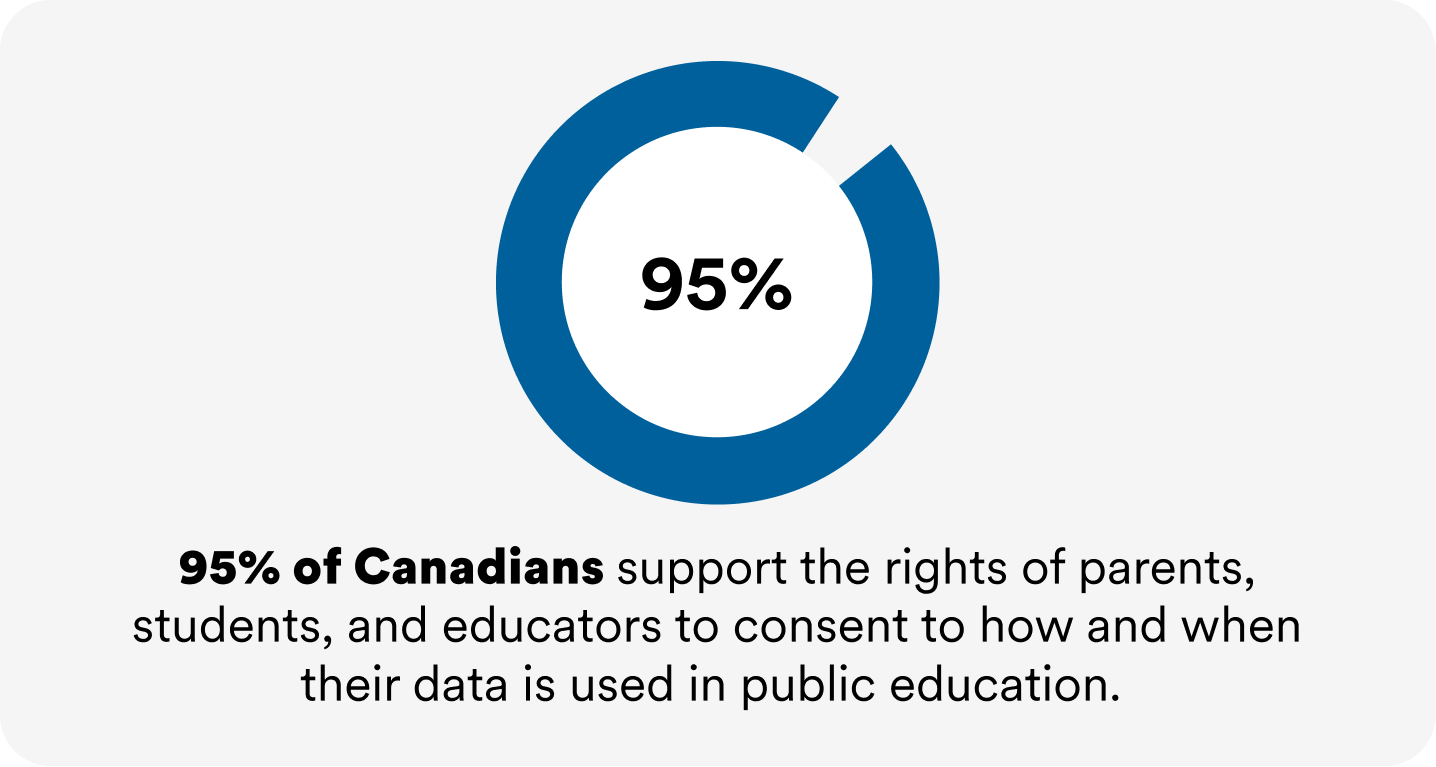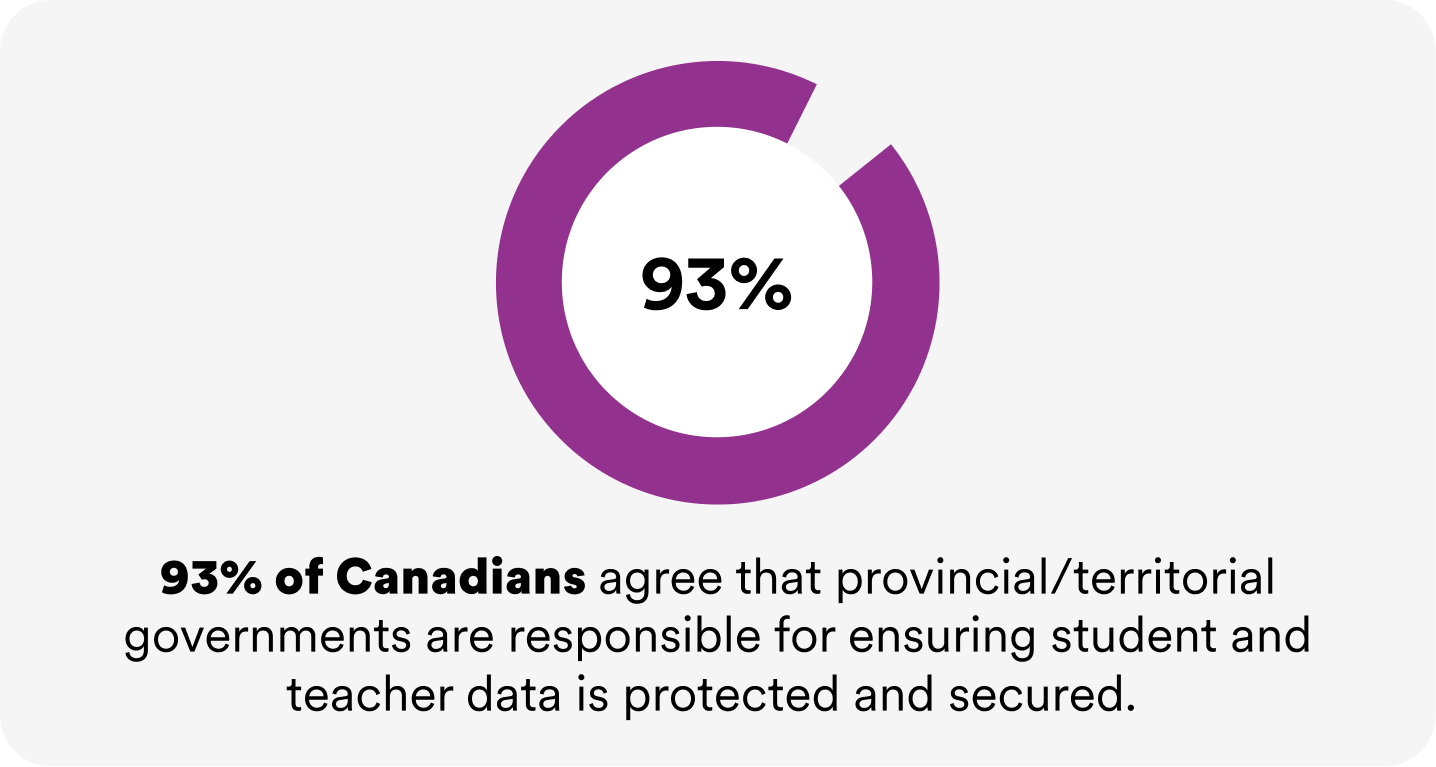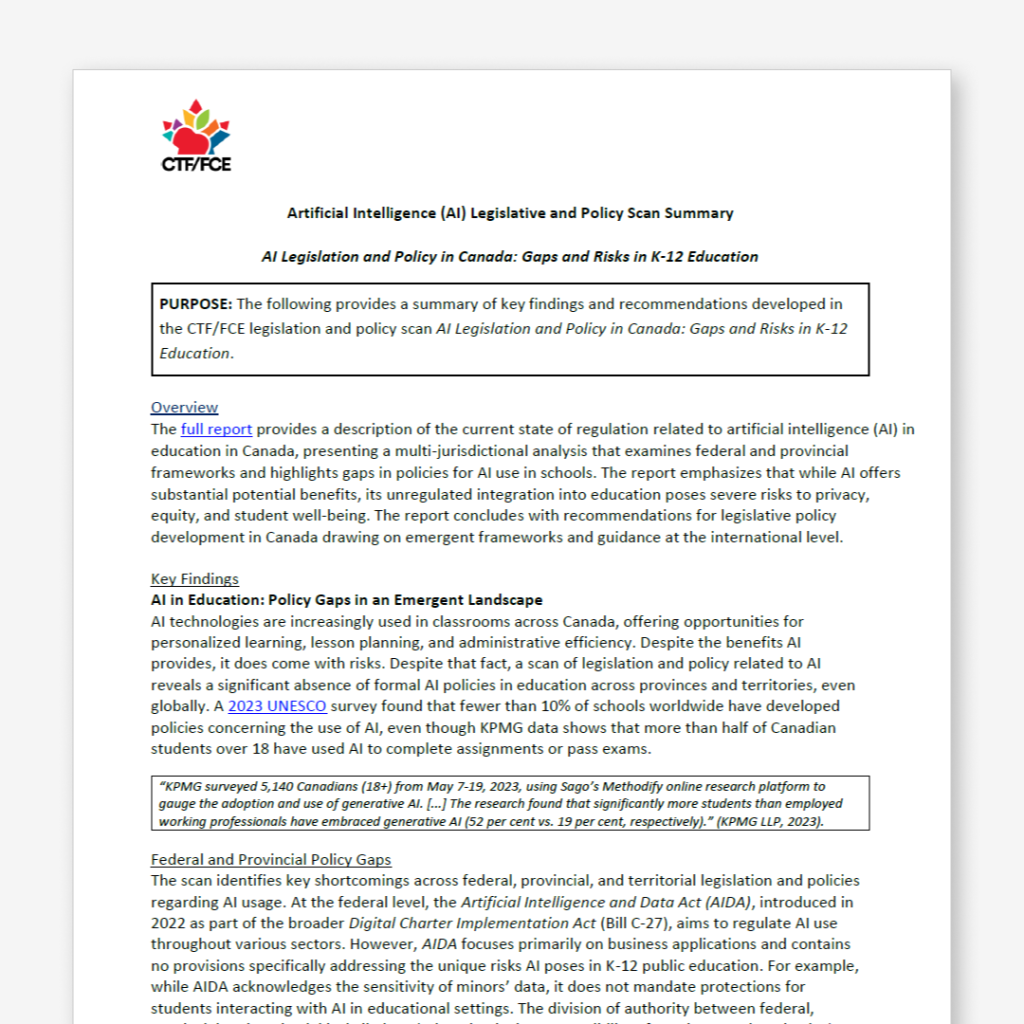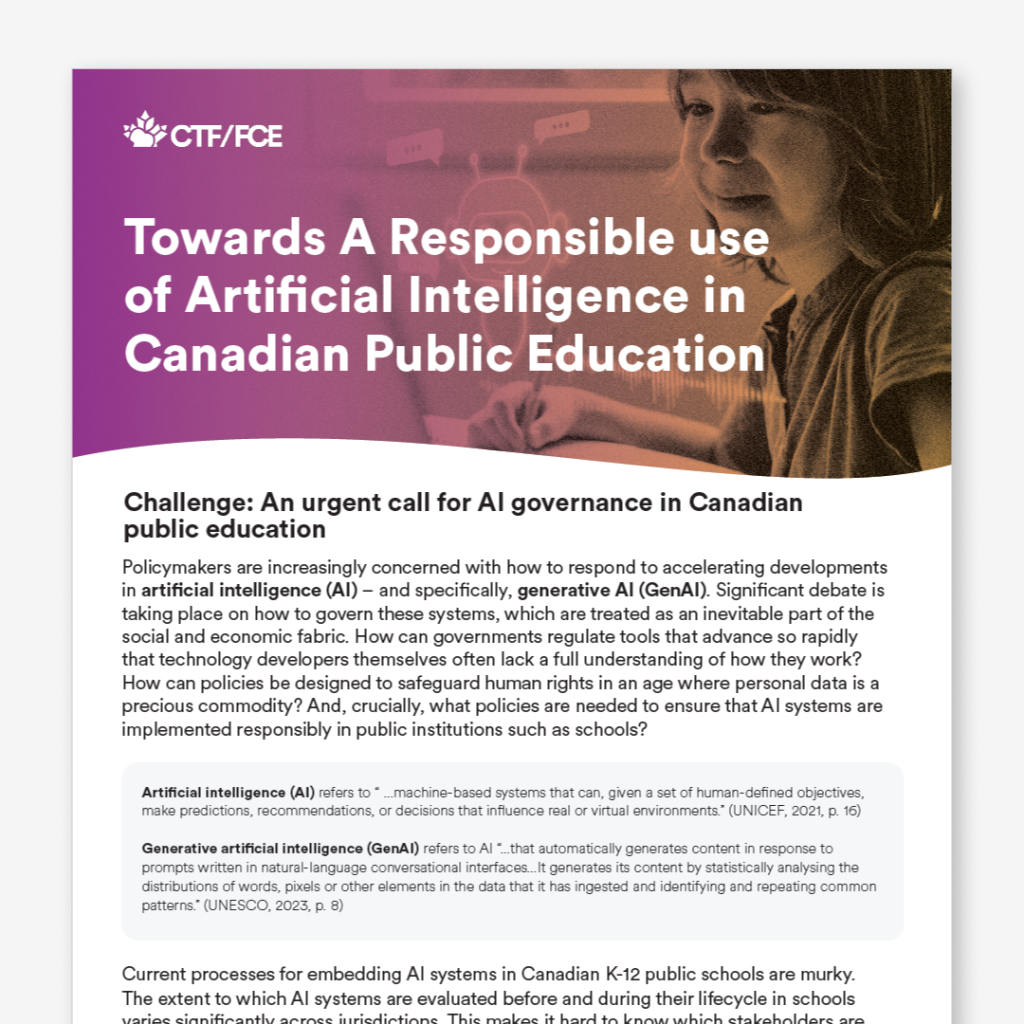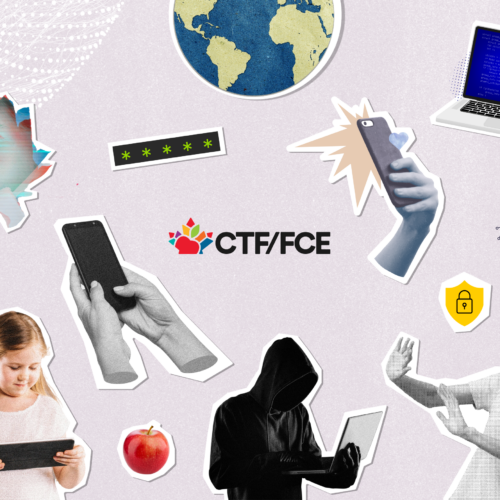Artificial Intelligence in Public Education

Regulating the Use of AI in Canadian K-12 Public Education
Governments need to take urgent action to regulate the use of artificial intelligence (AI) in Canadian K-12 public education.
The integration of AI in education raises ethical, pedagogical, and policy concerns, necessitating responsible and well-regulated approaches. Although educators are using AI to enhance learning for their students, there is minimal guidance or protective measures in place. This leaves teachers and students exposed to risks such as data breaches, algorithmic bias, and decline in professional standards in education.
The CTF/FCE is committed to ensuring that the use of AI in public education benefits both students and educators. It is important that AI supports, rather than replaces, human-centered learning in today’s educational environment.
How can you take action? Check out the resources below to learn more and spread the word.
Demanding Strong AI Policies for Public Education
Canada needs a comprehensive AI governance framework that prioritizes equity, transparency, and accountability in K-12 public education.
Right now, Canada lacks clear federal and provincial/territorial policies to ensure AI systems in schools are safe, ethical, and equitable. Without urgent action, teachers will continue to face the burden of managing AI’s impact on students – without the protections or guidance they deserve.
The Federal Legislative Landscape
The proposed Artificial Intelligence and Data Act (AIDA) was introduced within the federal government’s Bill C-27, tabled during the 44th Canadian Parliament. While AIDA addresses data protection broadly, it does not include explicit provisions specific to the unique risks of AI in education, especially concerning minors.
However, the dissolution of the 44th Parliament on March 23, 2025, terminated this Bill. The legislation must be reintroduced in the next session of Parliament to be considered as a bill once again.
The CTF/FCE’s Calls to Action
The CTF/FCE calls on the federal government and the Council of Ministers of Education, Canada (CMEC) to work with provinces and territories to put in place strong, enforceable policies that:
- Protect student privacy and data security;
- Regulate how AI is used in classrooms;
- Promote responsible and ethical use of AI systems in public education.
Together, we can shape a future where technology empowers education, rather than undermines it.
Defining AI in Canadian Public Education
Schools store vast amounts of sensitive data, yet many lack the necessary cybersecurity infrastructure to protect against cyber threats. Concerns about data privacy and security are magnified as AI and generative AI (GenAI) tools become increasingly integrated into educational settings.
Artificial intelligence (AI) refers to “…machine-based systems that can, given a set of human-defined objectives, make predictions, recommendations, or decisions that influence real or virtual environments.” UNICEF, 2021, p.16
Generative artificial intelligence (GenAI) refers to AI “…that automatically generates content in response to prompts written in natural-language conversational interfaces…It generates its content by statistically analysing the distributions of words, pixels or other elements in the data that it has ingested and identifying and repeating common patterns.” UNESCO, 2023, p.8

PowerSchool Data Breach: A Cautionary Tale
In December 2024, PowerSchool, a leading provider of cloud-based educational software, suffered a significant data breach, compromising the personal information of students and educators across Canada and the United States.
Unauthorized access to the PowerSource customer support portal enabled attackers to infiltrate PowerSchool’s Student Information System (SIS), exposing sensitive data, including names, contact details, dates of birth, medical records, and, in some cases, Social Security Numbers (TechTarget, 2025).
In Canada alone, 76% of Canadian students use PowerSchool products, with the breach impacting over 80 school boards across seven provinces and one territory. For instance, the Toronto District School Board confirmed the exposure of data for approximately 1.5 million students.
The PowerSchool breach underscores the urgent need for robust cybersecurity measures in Canada’s K-12 public education system.
Key Research Insights
Public Opinion
National public opinion polling, conducted by Abacus Data on behalf of the CTF/FCE in 2024, revealed:
- 95% of Canadians support the rights of parents, students, and educators to consent to how and when their data is used in public education.
- 93% of Canadians agree that provincial/territorial governments are responsible for ensuring student and teacher data is protected and secured.
Surveys
- A 2023 UNESCO survey found that fewer than 10% of schools worldwide have developed policies concerning the use of AI.
- 2023 KPMG data shows that more than half of Canadian students over 18 have used AI to complete assignments or pass exams.
Recommendations
Multi-level Governance Approach
Provincial and territorial governments play a crucial role in AI regulation, particularly since education is under their jurisdiction. However, most provinces and territories lack comprehensive AI frameworks and policies to ensure ethical and responsible integration. To date, only Ontario, Quebec, Alberta, and British Columbia have an AI framework or guidelines.
To dig deeper, review the AI Legislative and Policy Scan Summary: AI Legislation and Policy in Canada: Gaps and Risks in K-12 Education.
To ensure AI enhances rather than disrupts public education, a multi-level governance approach is essential:
Government of Canada
- Regulate national AI strategies, privacy, and data protection measures.
- Adopt measures to regulate AI in education, emphasizing the need for stronger privacy protections and transparent accountability mechanisms.
Example: amend the Artificial Intelligence and Data Act to include education-specific regulations in order to address high-impact AI systems.
Provincial and territorial governments
- Oversee key areas such as AI-specific curriculum development, classroom integration, and teacher training.
- Collaborate with boards, unions, schools, and teacher professionals to ensure coordinated protections and AI policies for educators.
School boards
- In consultation with the provinces and territories, implement regulated measures for:
- The procurement and use of AI software, ensuring it aligns with ethical and pedagogical standards.
- Privacy protection that safeguards student and teacher data.
- Equitable access to AI technologies, preventing further disparities in education.
Multi-Level Governance Approach
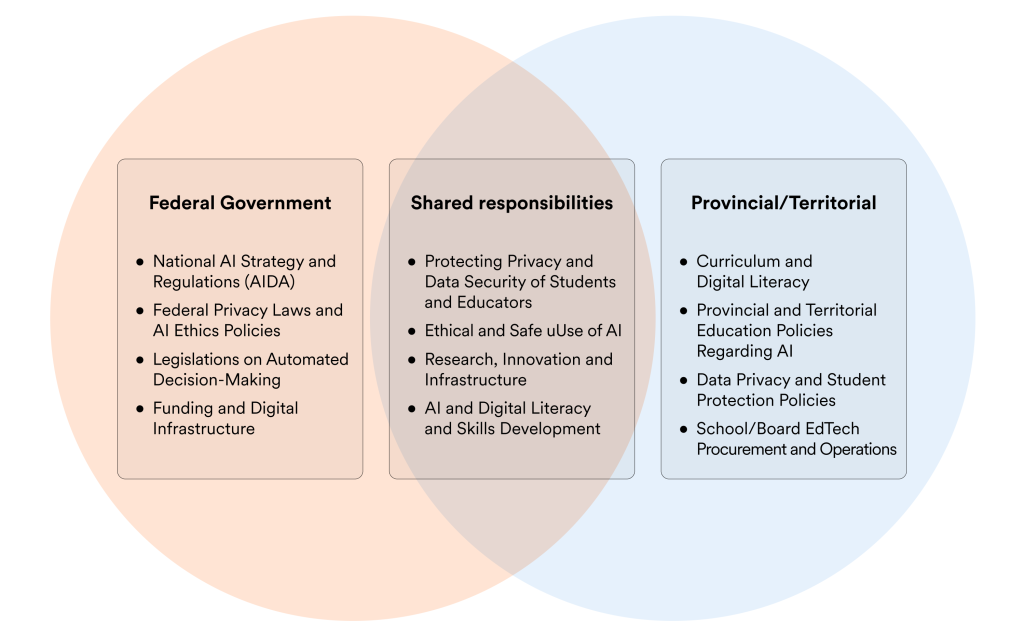
Without coordinated action, proactive policy measures, and clear accountability, educational institutions remain vulnerable to cyber threats. Governments at all levels must act now to develop and enforce policies that protect the rights of teachers and students.
Resources
Source, podcast episode
In this episode of Source, Dr. Christina J. Colclough, founder of The Why Not Lab and advocate for the digital rights of workers, discusses the impacts of digital technologies and AI on education workers. Tune in to learn more about how to protect labour rights and privacy, tools to support bargaining around digital tech, and digital rights advocacy.
AI Guidelines in Absence of Legislation
In the absence of formal AI legislation, various education bodies have stepped in to provide guidelines to promote the responsible use of AI in schools. Notably, AI guidelines have been introduced by:
- The governments of British Columbia, New Brunswick, and Quebec (in French only) — through the Conseil supérieur de l’éducation and the Commission de l’éthique en science et en technologie.
- School boards such as the Ottawa Catholic School Board, the Waterloo Catholic District School Board, the Holy Trinity Catholic School Division, and the Lloydminster Public School Division.
These guidelines aim to protect student privacy, ensure ethical AI use, and address concerns regarding the health and safety of students and educators. However, they also shift much of the responsibility onto teachers, expecting them to navigate AI tools while ensuring privacy, exercising professional judgment, and promoting responsible AI use among students. This highlights the need for urgent action from all levels of government.
Please view the PDF for additional resources.

